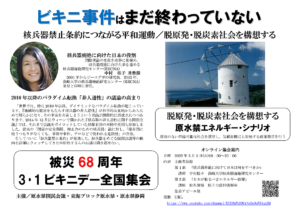2022年02月28日
ロシア・プーチン大統領が2月27日、戦略的核抑止部隊に「特別警戒」を命令したことを受け、原水禁は下記の声明を発表しました。
ロシア・プーチン大統領の核兵器による威嚇に対する原水禁声明
2月24日、ロシア・プーチン大統領は、ウクライナへの軍事侵攻に踏み切った。国家主権と領土を武力で侵すことは国際秩序を揺るがす蛮行であり断じて許されない。
軍事侵攻後の同月27日、プーチン大統領は、戦略的核抑止部隊に「特別警戒」を命令した。ロシアの核部隊にとって、「特別警戒」は最高レベルの警戒態勢であり、三度目の「核兵器」が使用される危険な状況である。
プーチン大統領は、「核戦力」をちらつかせることで、制裁を強めた欧米を牽制する狙いがあるのだろうが、核兵器禁止条約が発効し、核兵器の非人道性が指摘された中でのプーチン大統領の命令は「核兵器」を弄ぶものであり、断じて許されず、原水禁は、強く非難する。
1月3日、核兵器を保有する5ヶ国は「中国、フランス、ロシア、英国、米国は、核保有国間の戦争を回避し、戦略的リスクを低減することが、我々にとって最も重要な責務だと考えている。」「核戦争に勝者はなく、決してその戦いはしてはならないことを確認する。」等を含む「核保有国5ヶ国のリーダーによる、核戦争を防ぎ、軍拡競争を避けることについての共同声明」を発表した。当然、核保有国5ヶ国のリーダーの一人であるプーチン大統領には、この共同声明を遵守し、「核戦争」を防ぐ義務がある。
ロシア・ウクライナ両国が、停戦交渉を実施することに同意したとの報道が出ているが、原水禁は、ロシア軍の即時撤退と国際社会への対話の窓口を開くことを強く要求する。
2022年2月28日
原水爆禁止日本国民会議
共同議長 川野 浩一
金子 哲夫
藤本 泰成
2022年02月25日
ロシア軍のウクライナ軍事侵攻に対し、原水爆禁止日本国民会議はフォーラム平和・人権・環境と連名で声明を発表しました。
ロシアのウクライナ侵攻に抗議する
ロシアのプーチン大統領は、2月24日、ウクライナへの軍事侵攻に踏み切った。度重なる警告を無視し対話のチャンネルを放棄する形での侵攻は、欧米をはじめとして国際社会と決定的に対立することとなった。すでに民間人も含む多数の死傷者がでている。国家主権と領土を武力で侵すことは国際秩序を揺るがす蛮行であり断じて許されない。ロシアは、即刻武力侵攻を中止し、ロシア軍を撤退させ、国際社会との対話の席に着かなくてはならない。
プーチン大統領は、北大西洋条約機構(NATO)の拡大を恐れ、ドネツク人民共和国およびルガンスク人民共和国の親ロシア政権の独立を承認するとともに、ロシア系住民への迫害があるなどの理由で「自衛」を口実にウクライナに侵攻した。これは、この地域の紛争解決のためのミンスク合意を反故にするものであり、迫害の事実があれば、まずは国際社会へ問うべきである。ウクライナがロシアを攻撃する意図はないと繰り返し表明していた中での軍事侵攻は、国際社会の理解は得られることはない。「自衛」のために攻撃が正当化されることは、日本の岸田政権が主張している「敵基地攻撃論」にも通ずるものであり、危険な論理だ。多くの戦争は「自衛」の名の下に引き起こされてきた。それが無辜の市民に多大な犠牲を強いることは自明であり、許されることではない。
この間プーチン大統領は、公然と核兵器使用をほのめかす発言をし、侵攻前には核兵器搭載可能な大陸間弾道ミサイルを使った軍事演習を実施するなど、核による威嚇を繰り返してきた。核兵器禁止条約が発効し、核兵器の非人道性が指摘され中でのプーチン大統領の発言は、「核兵器」を弄ぶものであり、断じて許されない。
ロシア軍がチェルノブイリ原発を武力制圧したとの報道もある。1986年に事故を起こしたチェルノブイリ原発の安全が懸念される。ウクライナでは15基の原発が稼働しているが、それら原発が武力衝突の中で安全が確保できるのかも懸念される。核兵器の攻撃がなくても原発の存在は大きな脅威である。福島原発事故を経験した私たち日本社会もそのことを忘れてはならない。
ロシアは、ウクライナ東部の独立を承認した地域に留まらず、ウクライナ全土に軍事展開している。事態は予断を許さない。平和フォーラム・原水禁は、ロシア軍の即時撤退と国際社会への対話の窓口を開くことを強く要求する。
2022年2月25日
フォーラム平和・人権・環境
原水爆禁止日本国民会議
2022年02月03日
原水禁は、2月3日付で下記の声明を発表しました。
EUが原発を「持続可能な経済活動」と認める方針を発表したことに対する
原水禁声明
2月2日、ヨーロッパ連合(EU)の執行機関・ヨーロッパ委員会は、温室効果ガスの排出削減に役立つとして、原子力発電を条件付きで「持続可能な経済活動」として認め、民間の投資を促していく方針を正式に発表した。ヨーロッパ委員会のマクギネス委員は、まだ再生可能エネルギーだけに頼ることはできないという認識を示したうえで、「今回の方針は完璧ではないかもしれないが、現実的な解決策だ。脱炭素という究極の目標にわれわれを近づけるものだ。」と述べた。
EUは、温室効果ガスの排出量を2050年までに実質ゼロにする目標を実現するため、「環境面で持続可能な経済活動」を選定して民間の投資を促していく計画で、気候変動対策などとして原発を新設する方針を打ち出すEU加盟国が相次いでいる。今回の方針では、原発を新設する場合、持続可能と認める条件として、①2045年までにEU加盟国の当局から建設の許可を得ること、②高レベル放射性廃棄物については、EU加盟国が2050年までに処分場を稼働するための具体的な計画を作ること、などとした。
EU加盟国のうち、脱原発を進めているドイツやオーストリアは、今回の方針に当然反対している。2011年の東京電力福島第一原子力発電所の事故を受けて脱原発を進め、2022年内にすべての原発の運転が止まる予定のドイツ・ハーベック経済・気候保護大臣は、「原子力エネルギーにはリスクがあり、コストも高い」としてEUの方針を批判したうえで、今後の対応を検討する考えを示した。また、国内の原発利用を40年以上禁じてきたオーストリア・ネハンマー首相は、「原子力はグリーンでも持続可能でもない。EUの決定は理解できない」と表明し、オーストリア政府は、ヨーロッパ委員会をEU司法裁判所に提訴する方針を表明した。ルクセンブルク・トゥルメスエネルギー大臣もオーストリアとともに法的措置を検討すると表明した。
しかし、今後、6ヶ月以内にEU加盟27ヶ国のうち少なくとも20ヶ国が反対するなどしなければ、2023年1月から適用され、原発を「環境にやさしい」「持続可能」と、EUがお墨付きを与えることになる。
日本国内の福島原発事故およびその後の廃炉状況、高レベル放射性廃棄物処理の問題等を見れば、原発は、大規模な事故のリスク、核廃棄物処理、さらにはウラン採掘にともなう被曝や環境汚染など、多くの問題があり、とても「持続可能」ではない。今回のEUの方針を原水禁は絶対に認めることはできない。
原水禁は、2021年3月、2030年までに原発・石炭火力ゼロを訴えた政策提言をまとめ、原水禁エネルギー・シナリオとして発表し、政府、経済産業省や国会議員へ提出してきた。原水禁は、脱原発・脱炭素社会の実現は、気候危機に対する唯一の解決策であり、困難な道のりではあるが、達成可能と考えている。福島原発事故からまもなく11年。新たな状況を踏まえ、硬直化したエネルギー政策を見直し、脱原発・脱炭素社会へむけた行動を強く求める。環境に優しく、持続可能な社会は不可能ではない。
2022年2月3日
原水爆禁止日本国民会議
共同議長 川野 浩一
金子 哲夫
藤本 泰成
Statement of Japan Congress against A- and H- Bombs (GENSUIKIN) on the EU’s policy announcement to recognize nuclear power generation as a “sustainable economic activity”
On February 2, the European Commission, the European Union’s executive body, officially announced its policy to conditionally recognize nuclear power generation as a “sustainable economic activity” and encourage private investment, saying it would help reduce greenhouse gas emissions. Mairead McGuinness, the EU commissioner, while recognizing that it is not yet possible to rely solely on renewable energy, said “This policy may not be perfect, but it’s a viable solution. It brings us closer to our ultimate goal of decarbonization.”
The EU plans to select “environmentally sustainable economic activities” to encourage private investment in order to achieve the goal of virtually zero greenhouse gas emissions by 2050. A string of EU member states have announced policies to build new nuclear power plants as a countermeasure to climate change.
Under this EU policy, when constructing a new nuclear power plant, the conditions to be recognized as sustainable are as follows: (1) Obtain permission from the authorities of EU member states by 2045, and (2) For high-level radioactive waste, EU member states make a concrete plan to operate the disposal site by 2050.
Of the EU member states, Germany and Austria, which have been shifting away from nuclear power generation, are naturally opposing to this policy. Robert Habeck, minister for the economy and climate protection of Germany which has been phasing out of nuclear power after the accident at the Fukushima Daiichi Nuclear Power Station of Tokyo Electric Power Company in 2011 and plans to shut down the operation of all nuclear power plants by 2022, criticized the EU policy and said, “Nuclear energy has risks, and also, the cost is high” and indicated he would examine how to handle it in the days ahead. Chancellor Karl Nehammer of Austria which has banned the use of nuclear power in the country for more than 40 years, stated that “nuclear power is neither green nor sustainable. I cannot accept the EU’s decision.” The Austrian government announced to file legal action against the European Commission at the European Court of Justice. Claude Turmes, the Minister for Energy of Luxembourg, also announced that Luxembourg, in cooperation with Austria, is also considering legal action.
Nevertheless, unless at least 20 of the 27 EU member states object to this policy within the next 6 months, this policy is expected to apply as of January 2023, which means that the EU will give endorsement to nuclear power plants as “environmentally friendly” and “sustainable”.
In looking at the Fukushima nuclear accident in Japan and the subsequent decommissioning situation, and the problem of high-level radioactive waste treatment, etc. it is obvious that nuclear power is not “sustainable”, since it has many problems, such as risk of large-scale accidents, nuclear waste treatment, and radioactive exposure and environmental pollution associated with uranium mining. GENSUIKIN maintains the EU policy is not acceptable at all.
In March 2021, GENSUIKIN compiled a policy proposal appealing for zero nuclear power and zero coal-fired power by 2030, announcing it as its Energy Scenario. We submitted it to Ministry of Economy and Industry and Diet members. GENSUIKIN believes that the realization of a nuclear power free and decarbonized society is difficult but only achievable solution to the climate crisis, It has been almost 11 years since the Fukushima nuclear power plant accident. In light of the new situation, we strongly call for a review of the rigid energy policy and action toward a nuclear power free and carbon free society. An environmentally friendly and sustainable society is possible.
February 3, 2022
Koichi Kawano
Tetsuo Kaneko
Yasunari Fujimoto
Co-Chairs
Japan Congress against A- and H- Bombs (GENSUIKIN)

